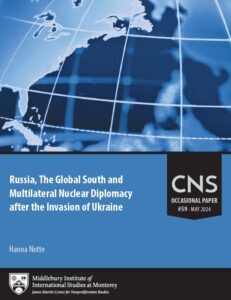May 2, 2024
Hanna Notte
Abstract
Russia’s full-scale invasion of Ukraine in 2022 had a detrimental impact on multilateral nuclear diplomacy. The war caused an earthquake in procedure, paralyzing processes at the International Atomic Energy Agency, the United Nations First Committee, and meetings dealing with the Treaty on the Non-Proliferation of Nuclear Weapons. This was the case even as Russia’s nuclear saber-rattling and occupation of Ukrainian nuclear power plants, and Europe’s recommitment to nuclear weapons, demonstrated the ongoing need for nuclear dialogue. States from the Global South tended to navigate cautiously vis-à-vis Russia across the multilateral nuclear negotiating forums. Amid greater difficulties in forging common positions on nuclear issues related to the Ukraine war, these states were also frustrated with what they perceived as a deprioritization of their interests in multilateral nuclear diplomacy. Western states, especially during the first year of the war, were seen as exercising unwelcome pressure on the Global South to take sides against Russia. Russia, meanwhile, pursued a dual strategy, undermining nonproliferation efforts and chipping away at trust in legacy institutions, while also leveraging these forums in pursuit of greater alignment with states in the Global South. The implications of these different dynamics for the health of the nuclear order may take some time to fully play out, but will likely be profound.

